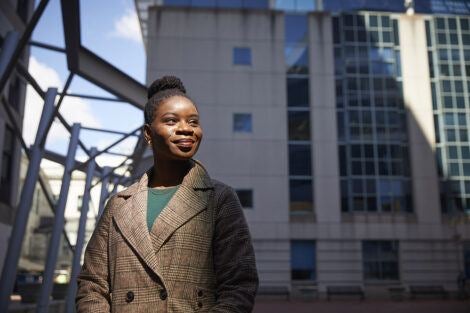May 3, 2022—Patience Saaka is a physician from Ghana with a passion for promoting equity in health care and ending gender-based violence. In a recent interview, she described the new digital venture she hopes to focus on after she graduates from Harvard T.H. Chan School of Public Health in May—a system to help rural providers in Ghana access blood products—and the book that kicked off her lifelong love of science.
I grew up in northern Ghana, mostly in Damongo and Tamale. They were very communal, the kind of places where you could run to your neighbor’s house for salt when you ran out, or to find someone to play with. But there were also aspects that were very difficult. We had a small community clinic in Damongo, run by a nurse who couldn’t always be there. At that time, it was common to know someone who had fallen ill and gone to the clinic, but never came home.
Both of my parents were teachers. Any time my father traveled, he came back with a book. There was one I loved called 365 Fantastic Facts. I spent a lot of time reading it and became fascinated by science. I also had a teacher who played a key role in my love for science and my desire to learn. When I was about eight years old, he told me about the great female scientist Marie Curie, who discovered radioactivity. As I learned more about her, I thought I wanted to be like her when I grew up, to do something that brings some change to the world.
After my medical training, I went to work at a hospital in a rural mining town in Ghana. Soon, I started seeing victims of sexual violence in my emergency room. One I can’t forget was a 12-year-old girl who had been brought in, bleeding. I remember going into the examining room and finding this tiny little girl. Later, I learned that her rapist had been released from police custody and had not been charged because he was very well connected. Meanwhile, this young lady was going to have to live with the trauma of what he’d done to her.
I learned that sexual violence is very common in mining communities where there are large numbers of young men coming in to work. Young women are out on the streets and mining sites working as petty traders [selling food, water, and other convenience items] to help support their families, and this puts them in a vulnerable position. I started speaking with these girls and doing what I could to help. I recruited some psychologist colleagues to offer counseling, and was able to help some of the girls who had gotten pregnant and had to drop out of school find vocational placements, and supported others to go back to school after they had their babies.
I’ve always wanted to fix health systems, to narrow the gaps in access to care in places like the community where I grew up. When I was starting my residency training in radiology, I realized that very few people could afford advanced imaging. In Ghana, x-rays are covered by national health insurance, but there’s only so much they can diagnose. I decided to come to the Harvard Chan School to learn more about what can be done about these kinds of disparities.
It’s been inspiring to hear from people like Richard Cash, whose work on oral rehydration therapy for patients with diarrheal diseases saves thousands of lives every year. It’s such a basic treatment, yet it makes an incredible difference. Change takes time, and you probably won’t get there by just waiting for the big thing to happen. You start small and grow.
For my Rose Service Learning Fellowship project, I’ve been working with women in the town of Bolgatanga, Ghana. In this part of the country, widowhood rites are very common. They are practiced in some form across Ghana, but here women who lose their husbands are typically confined in a room with nothing on but leaves around their waist for several days. Their hair is brutally shaved, sometimes with broken glass or unsanitary razors, leading to injuries and infections. They are given little food and no health care. On top of that, their property is repossessed by their husband’s relatives, and they and their children are left with nothing.
I’ve been working with an incredible local organization in Bolgatanga, the Widows and Orphans Movement, that is advocating for women and children and also helping women learn new skills to support their families. We’re gathering the stories of women who have experienced these rites and learning about how it affected their physical and mental health. We’ll be creating animated videos of their stories to share on social media and raise awareness.
I’m working on a venture to improve access to blood and blood products for women and children in rural communities in Ghana, where access is very limited. I’m developing a system that facilitates availability of these products to patients when and where they need them. After graduation, I’ll be taking some time to work on this and will also be completing my residency training.
Photo: Kent Dayton
